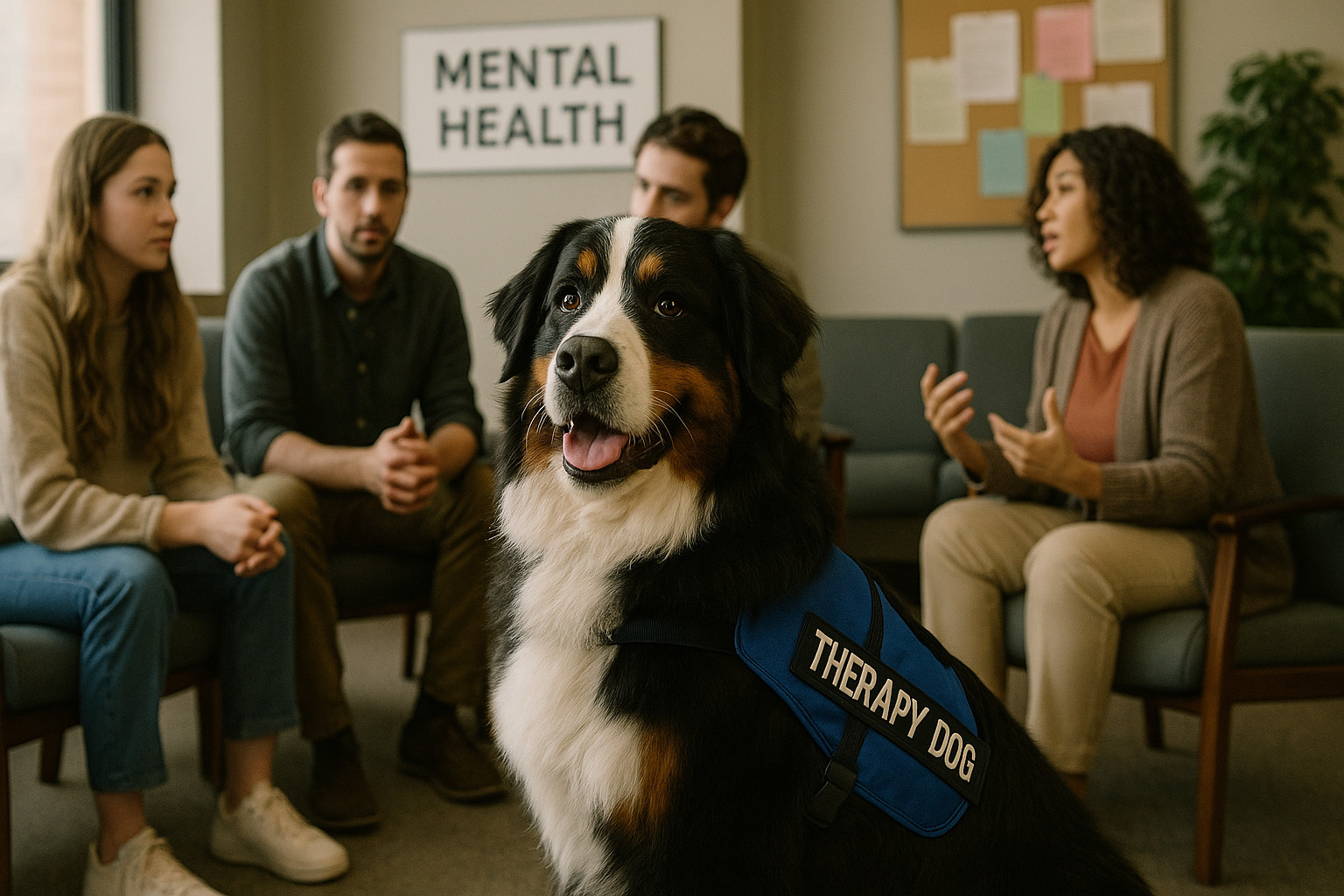Bernese Mountain Dog as a Therapy Dog
Get Your Documents

Bernese Mountain Dog as a Therapy Dog Overview
The Bernese Mountain Dog, with its calm demeanor and affectionate nature, has the potential to excel as a therapy dog. Known for their gentle giant persona, they possess traits that can be effectively leveraged in various therapeutic contexts to provide emotional support and companionship.
Understanding the Therapy Dog Role
Therapy dogs are trained to provide comfort and alleviate anxiety or stress in various settings. Unlike service dogs, therapy dogs visit different environments to offer support through interaction. They don’t have the same public access rights as service dogs but provide invaluable emotional aid in settings like hospitals, schools, and rehabilitation centers.
Bernese Mountain Dogs fit well into the therapy dog role due to their naturally calming presence and ability to connect deeply with humans. Their temperament often enables them to respond empathetically to emotional cues, making them excellent companions for individuals needing psychological or emotional support.
Physical Appearance and Energy Level
Bernese Mountain Dogs are visually striking, with their tricolored coat and large size. They have a sturdy build, which can be comforting to those who find solace in physical touch and grounding through touch. Their energy level is moderate, striking an ideal balance for therapy work as they are playful when appropriate but can calmly settle by someone’s side. This adaptability in energy levels allows them to adjust to different environments, be it a bustling school or a quiet hospital room.
Personality and Emotional Intelligence
Bernese Mountain Dogs are renowned for their gentle and affectionate nature. They are loyal and have a strong desire to bond with humans, which enhances their effectiveness as therapy dogs. Their high emotional intelligence allows them to sense when someone is in distress or needs comfort, responding with cuddles or quiet companionship. This intuitive understanding of human emotions is crucial in therapeutic settings where individuals might not verbalize their needs.
Environments Where Bernese Mountain Dog Excels
Due to their calm temperament and adaptability, Bernese Mountain Dogs thrive in various environments:
- Hospitals: Their gentle nature soothes patients and comforts those undergoing treatment or recovering from surgery.
- Schools: Their friendly disposition makes them favorites among children, providing stress relief during exams or emotional support in special education settings.
- Rehabilitation centers: Their stable presence helps individuals undergoing physical or occupational therapy, offering encouragement and motivation through physical interaction.
Common Therapy Settings
In therapy environments, the Bernese Mountain Dog can be a positive influence in:
- Elderly Care Facilities: Their gentle ways and ability to offer consistent companionship make them excellent partners for the elderly, assisting with loneliness and providing emotional connection.
- Mental Health Clinics: Their ability to respond to emotional needs makes them well-suited for assisting during therapy sessions or counseling.
Interactions with Different Populations
Bernese Mountain Dogs are particularly effective in engaging with diverse populations, adept at handling varied emotional and psychological needs:
- Children and Adolescents: Their playful yet calm demeanor makes interactions with younger individuals both enjoyable and therapeutic. They can assist in easing anxiety and encouraging social engagement.
- Adults and Seniors: Their comforting presence is effective in reducing stress and promoting relaxation, essential for adults and older individuals dealing with life’s various stressors.
Health and Wellness Factors
Maintaining the health and wellness of a Bernese Mountain Dog is essential for them to perform effectively as therapy dogs. Regular check-ups, a balanced diet, and appropriate exercise are vital. Their thick coat requires regular grooming to keep them comfortable and prevent shedding from becoming an issue in allergy-sensitive environments.
Lifespan and Common Health Issues
Bernese Mountain Dogs have a lifespan of approximately 6 to 8 years, which is relatively short compared to other breeds. Common health issues include hip and elbow dysplasia, heart problems, and certain types of cancer. These health considerations are crucial as they can affect a dog’s availability and effectiveness as a therapy dog over time.
Maintenance and Care Needs
Routine grooming is necessary due to their dense coat, requiring regular brushing to manage shedding. They also benefit from consistent dental care, ear cleaning, and nail trimming. While these tasks are part of general pet care, they are particularly important for therapy dogs to ensure they present well and are comfortable during visits.
Training and Certification Readiness
The Bernese Mountain Dog’s intelligence and eagerness to please facilitate training for therapy work. They respond well to positive reinforcement techniques and can quickly learn the commands and behaviors necessary for therapy certification. Their ability to maintain composure in stimulated environments and follow commands reliably is essential for passing standardized therapy dog evaluations.
Learning Style and Responsiveness
Bernese Mountain Dogs are highly responsive to their handlers, learning best through a clear, consistent approach. They benefit from training sessions that incorporate both mental stimulation and physical activity. Their capacity for learning complex commands makes them well-suited for tailored therapy tasks, such as fetching items to assist mobility-challenged individuals or performing tricks to entertain and engage patients.
Handling Social and Emotional Stimuli
This breed handles social and emotional stimuli with grace, showing a natural proclivity for empathy. They can distinguish between different human emotions and respond accordingly, providing comfort where needed. Their calm demeanor allows them to handle high-stress environments without becoming anxious or overstimulated themselves, a vital trait for therapy work.
Strengths, Limitations, and Ideal Roles for Bernese Mountain Dog
Strengths:
- High emotional intelligence and ability to connect deeply with humans.
- Adaptable energy levels suitable for various environments.
- Gentle and affectionate nature that comforts and soothes.
Limitations:
- Shorter lifespan compared to other breeds may impact long-term therapy roles.
- Prone to health issues that can limit their active years.
- Size may be intimidating in cramped spaces or among small, timid individuals.
Ideal Roles:
- Providing comfort and companionship in hospitals, schools, and care facilities.
- Serving as motivators in rehabilitation settings.
- Supporting emotional processing in mental health environments.
Final Thoughts
The Bernese Mountain Dog’s combination of size, temperament, and trainability makes them a standout choice for therapy dog work. While they face certain health challenges, their ability to provide unyielding comfort and emotional support is unparalleled. Their presence alone can transform the emotional landscape of a therapy session, bringing joy and solace to those in need.
Key Takeaways for the Bernese Mountain Dog as a Therapy Dog
- Best suited for: Hospitals, schools, rehabilitation centers, elder care facilities.
- Not ideal for: Compact spaces or environments with individuals intimidated by large dogs.
- Temperament highlights: Gentle, affectionate, emotionally intuitive.
- Care and health notes: Requires regular grooming and health monitoring due to predisposed health issues.
- Therapy environments where they shine: Situations that benefit from a stable, calming presence and gentle interaction.
Get Your Documents
Example State Cards













